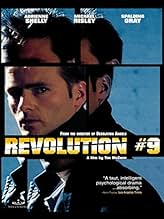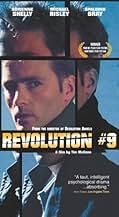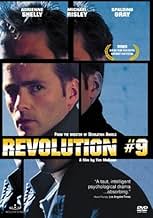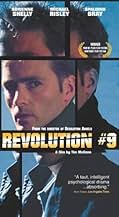A handsome and successful young man's life begins to unravel when he develops an acute sense of paranoia. Things escalate when Jackson is convinced that a tv ad holds sinister messages aimed... Read allA handsome and successful young man's life begins to unravel when he develops an acute sense of paranoia. Things escalate when Jackson is convinced that a tv ad holds sinister messages aimed at him. Is Jackson losing his mind, or are the threats real?A handsome and successful young man's life begins to unravel when he develops an acute sense of paranoia. Things escalate when Jackson is convinced that a tv ad holds sinister messages aimed at him. Is Jackson losing his mind, or are the threats real?
- Awards
- 2 wins & 1 nomination total
James Burton
- Therapist Fuller
- (as Jim Burton)
Phyllis Somerville
- Judge Hathaway
- (as Phyllis Sommerville)
- Director
- Writer
- All cast & crew
- Production, box office & more at IMDbPro
Featured reviews
Realistic portrayal of a man's descent into mental illness coupled with sharp media satire. Speaks volumes about our society's over saturation of commercialism and suggestive imagery. Amazing performances flesh out a dark, edgy story that definitely deserves recognition.
10redlog
A taut, edgy psychological drama, brilliantly acted by newcomer Michael Risley and veteran Adrienne Shelly. I know of no other film that so honestly and nakedly depicts mental illness, that takes the viewer inside the excruciatingly painful experience of gradually losing one's grip on reality and forfeiting control of one's life. At the same time, the protagonist's notion that he is the target of a media conspiracy is depicted as merely an exaggerated and distorted version of the overwhelming media saturation and manipulation we all, each and every one of us, experience from day to day. "Take but degree away, untune that string, and hark what discord follows, " said Shakespeare's Ulysses in his play Troilus and Cressida. In this film we sense just how tenuous that string by which we hold onto our sanity, and to everything that matters to us in life, can be.
While the film takes us subjectively, with unnerving close-ups, odd angles, abrupt shifts of focus, into the disorienting experience of its protagonist, it at the same time creates an eerie sense of not only a character increasingly alienated from his world, but of a world of people, objects, even a cityscape themselves sensed as increasingly alien. In holding focus on an object or an image for just a second too long (that is, longer than would be needed to establish that it is the character's bizarre fixation), the unnerving gaze and the sense of the familiar turned suddenly unfamilar feels as if it is our own. In other words, the ordinary world starts to look like something we have never seen or noticed before.
All of this is accomplished by the director with the strength of honest story telling that is the tradmark of his work (Desolation Angels). As stylized and artistically accomplished as the film is, one never senses that it is trying to be self-consciously arty or manipulative for its own sake. It is the story told from the point of view of a man increasingly out of joint in a world itself falling out of joint. So truth, from this perspective, requires that the camera itself be "on tilt."
About the performances one can only admire the intensity and focus brought by Michael Risley to his portrayal of a man going out of focus. We are with him every step of the way, and---and this is I think the trick---our sympathy for him only increases the more off-putting and bizarre his behavior gets. Someone once said you have to be a pretty good skater to play a drunk on skates. Risely navigates this thin ice brilliantly. Adrienne Shelly is also utterly captivating in a very difficult part: the girlfriend who, though utterly powerless to help him, nevertheless tries---not only because she perhaps loves him, but because it is clear that no one else in the world cares or is even concerned. Without ever seeming to give up hope, she senses the situation's desperation, and what is finally at stake. And so, while played as someone vulnerable, even wounded, and tender, she nonetheless brings something of real human strength, even quiet heroism, to the part through her decency and forbearance.
Finally, the film is also, on another level, an indictment of the mental health system and about the cloud that still surrounds mental illness in this country. Legally, there is no way to hold Jackson (Risley's character). And he is too ill to commit himself. And even then, who would pay? Not the insurance companies to be sure. And families for the most part are either financially, emotionally, or socially ill-equipped to cope with the mentally ill. While the film takes the viewer, together with its lead actor, deeper and deeper into the vortex of madness, it nevertheless offers a sobering view of a troubling and grotesque social reality and of affliction that, on more than one level, hits close, too close, to home.
While the film takes us subjectively, with unnerving close-ups, odd angles, abrupt shifts of focus, into the disorienting experience of its protagonist, it at the same time creates an eerie sense of not only a character increasingly alienated from his world, but of a world of people, objects, even a cityscape themselves sensed as increasingly alien. In holding focus on an object or an image for just a second too long (that is, longer than would be needed to establish that it is the character's bizarre fixation), the unnerving gaze and the sense of the familiar turned suddenly unfamilar feels as if it is our own. In other words, the ordinary world starts to look like something we have never seen or noticed before.
All of this is accomplished by the director with the strength of honest story telling that is the tradmark of his work (Desolation Angels). As stylized and artistically accomplished as the film is, one never senses that it is trying to be self-consciously arty or manipulative for its own sake. It is the story told from the point of view of a man increasingly out of joint in a world itself falling out of joint. So truth, from this perspective, requires that the camera itself be "on tilt."
About the performances one can only admire the intensity and focus brought by Michael Risley to his portrayal of a man going out of focus. We are with him every step of the way, and---and this is I think the trick---our sympathy for him only increases the more off-putting and bizarre his behavior gets. Someone once said you have to be a pretty good skater to play a drunk on skates. Risely navigates this thin ice brilliantly. Adrienne Shelly is also utterly captivating in a very difficult part: the girlfriend who, though utterly powerless to help him, nevertheless tries---not only because she perhaps loves him, but because it is clear that no one else in the world cares or is even concerned. Without ever seeming to give up hope, she senses the situation's desperation, and what is finally at stake. And so, while played as someone vulnerable, even wounded, and tender, she nonetheless brings something of real human strength, even quiet heroism, to the part through her decency and forbearance.
Finally, the film is also, on another level, an indictment of the mental health system and about the cloud that still surrounds mental illness in this country. Legally, there is no way to hold Jackson (Risley's character). And he is too ill to commit himself. And even then, who would pay? Not the insurance companies to be sure. And families for the most part are either financially, emotionally, or socially ill-equipped to cope with the mentally ill. While the film takes the viewer, together with its lead actor, deeper and deeper into the vortex of madness, it nevertheless offers a sobering view of a troubling and grotesque social reality and of affliction that, on more than one level, hits close, too close, to home.
I've noticed that most of the comments on this film are from people who are either big fans of independent film or friends of those who have tragically sufferred from the disease portrayed by the film-makers. I am neither, and would like to recommend the film to others who consider themselves more mainstream. Yes, for a variety of reasons I won't go into (I don't want to ruin it) Hollywood might never have made this film. But that doesn't mean it isn't a gripping drama with more internal coherency than many big-budget pictures. The fact that it touches on some political issues is an added bonus to a movie that should, otherwise, appeal to open-minded but otherwise mainstream audience members. If you get a chance, check out this film, you won't regret it.
10kathyg-2
For hollywood histrionics, see Opie's "A Beautiful Mind. For a low-key, searing and accurate portrait of a schizophrenic drowning in his delusions, see this little film. I saw it at the Telluride Film Festival, and it was one of the best films there. Refreshingly free of scenery chewing for it's own sake, the lead actor has a terrific natural intensity. And the director has the balls to deliver the gut wrenching feel bad ending that is the only one appropriate to this subject matter at this time.
10B24
Surely this is what low-budget, independent filmmaking in terms of fulfilling its potential is all about. The unique qualities that differentiate film from other dramatic media like stage plays, audio-tapes, live television, etc. are evident in this film in great abundance. I was not at all put off by recurrent multiple visions, time-lapse episodes, color variations, and other visual effects that have annoyed one or two other viewers commenting here. What is truly amazing about the film is how it takes an ensemble of little-known actors and commonplace settings and creates something powerfully dramatic without losing the verité effect of a politically and socially relevant documentary.
As others have said about the subject matter (some seem very familiar with it in clinical terms), it grabs you by the throat and won't let go even after it comes to a rather abrupt end. I, too, have known people with similar mental illnesses, and have found myself in real life playing many of the roles pictured here -- though to varying degrees and with different outcomes. A sensitive viewer may even find himself or herself identifying strongly with one or another of the characters, which is always a measure of great acting and great storytelling. This film ought to be watched from beginning to end in a dark room with no one else present to offer comments, preferably late at night when one is left at the conclusion with no option except to relive the experiences for an hour or so in complete solitude.
This is a movie that comes with no laugh track. 10 of 10.
As others have said about the subject matter (some seem very familiar with it in clinical terms), it grabs you by the throat and won't let go even after it comes to a rather abrupt end. I, too, have known people with similar mental illnesses, and have found myself in real life playing many of the roles pictured here -- though to varying degrees and with different outcomes. A sensitive viewer may even find himself or herself identifying strongly with one or another of the characters, which is always a measure of great acting and great storytelling. This film ought to be watched from beginning to end in a dark room with no one else present to offer comments, preferably late at night when one is left at the conclusion with no option except to relive the experiences for an hour or so in complete solitude.
This is a movie that comes with no laugh track. 10 of 10.
Did you know
- Crazy creditsNo maggots were harmed during the making of this film.
- ConnectionsReferences L'éclipse (1962)
Details
Box office
- Budget
- $300,000 (estimated)
- Gross US & Canada
- $10,133
- Opening weekend US & Canada
- $4,936
- Nov 17, 2002
- Gross worldwide
- $10,133
Contribute to this page
Suggest an edit or add missing content
































